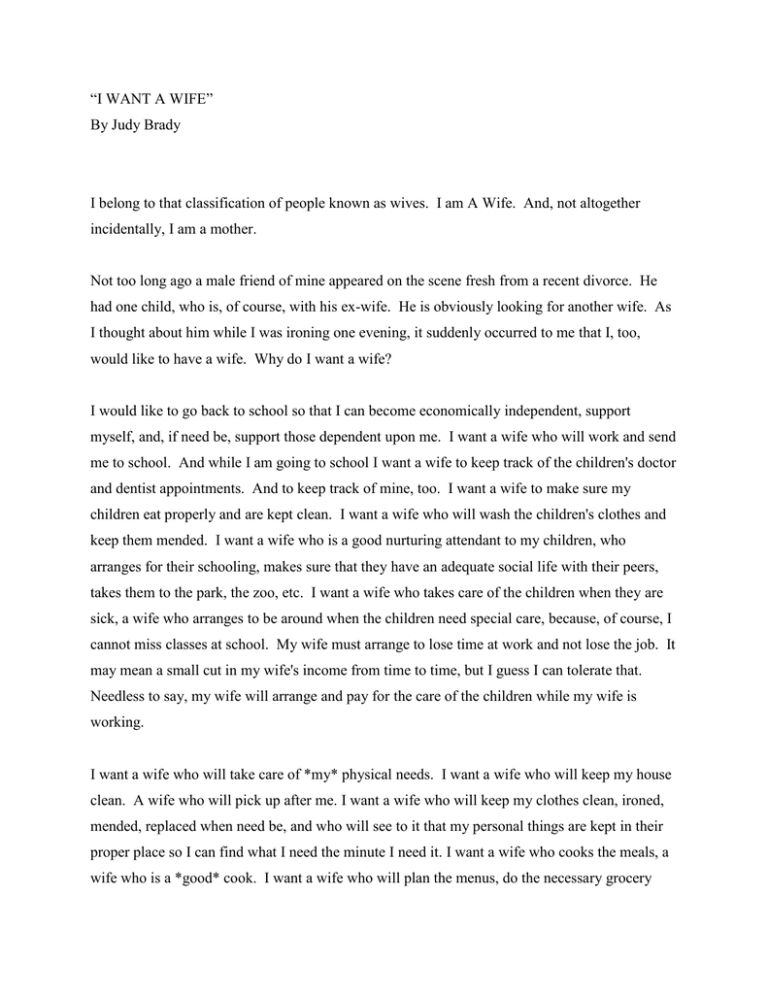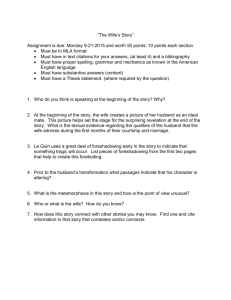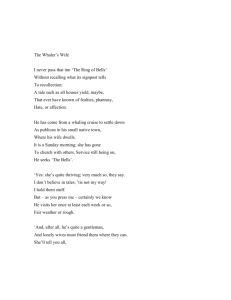
“I WANT A WIFE”
By Judy Brady
I belong to that classification of people known as wives. I am A Wife. And, not altogether
incidentally, I am a mother.
Not too long ago a male friend of mine appeared on the scene fresh from a recent divorce. He
had one child, who is, of course, with his ex-wife. He is obviously looking for another wife. As
I thought about him while I was ironing one evening, it suddenly occurred to me that I, too,
would like to have a wife. Why do I want a wife?
I would like to go back to school so that I can become economically independent, support
myself, and, if need be, support those dependent upon me. I want a wife who will work and send
me to school. And while I am going to school I want a wife to keep track of the children's doctor
and dentist appointments. And to keep track of mine, too. I want a wife to make sure my
children eat properly and are kept clean. I want a wife who will wash the children's clothes and
keep them mended. I want a wife who is a good nurturing attendant to my children, who
arranges for their schooling, makes sure that they have an adequate social life with their peers,
takes them to the park, the zoo, etc. I want a wife who takes care of the children when they are
sick, a wife who arranges to be around when the children need special care, because, of course, I
cannot miss classes at school. My wife must arrange to lose time at work and not lose the job. It
may mean a small cut in my wife's income from time to time, but I guess I can tolerate that.
Needless to say, my wife will arrange and pay for the care of the children while my wife is
working.
I want a wife who will take care of *my* physical needs. I want a wife who will keep my house
clean. A wife who will pick up after me. I want a wife who will keep my clothes clean, ironed,
mended, replaced when need be, and who will see to it that my personal things are kept in their
proper place so I can find what I need the minute I need it. I want a wife who cooks the meals, a
wife who is a *good* cook. I want a wife who will plan the menus, do the necessary grocery
shopping, prepare the meals, serve them pleasantly, and then do the cleaning up while I do my
studying. I want a wife who will care for me when I am sick and sympathize with my pain and
loss of time from school. I want a wife to go along when our family takes a vacation so that
someone can continue to care for me and my children when I need a rest and change of scene.
I want a wife who will not bother me with rambling complaints about a wife's duties. But I want
a wife who will listen to me when I feel the need to explain a rather difficult point I have come
across in my course of studies. And I want a wife who will type my papers for me when I have
written them.
I want a wife who will take care of the details of my social life. When my wife and I are invited
out by my friends, I want a wife who will take care of the babysitting arrangements. When I
meet people at school that I like and want to entertain, I want a wife who will have the house
clean, will prepare a special meal, serve it to me and my friends, and not interrupt when I talk
about the things that interest me and my friends. I want a wife who will have arranged that the
children are fed and ready for bed before my guests arrive so that the children do not bother us. I
want a wife who takes care of the needs of my guests so that they feel comfortable, who makes
sure that they have an ashtray, that they are passed the hors d'oeurves, that they are offered a
second helping of the food, that their wine glasses are replenished when necessary, that their
coffee is served to them as they like it.
And I want a wife who knows that sometimes I need a night out by myself.
I want a wife who is sensitive to my sexual needs a wife who makes love passionately and
eagerly when I feel like it, a wife who makes sure that I am satisfied. And, of course, I want a
wife who will not demand sexual attention when I am not in the mood for it. I want a wife who
assumes the complete responsibility for birth control, because I do not want more children. I
want a wife who will remain sexually faithful to me so that I do not have to clutter up my
intellectual life with jealousies. And I want a wife who understands that *my* sexual needs may
entail more than strict adherence to monogamy. I must, after all, be able to relate to people as
fully as possible.
If, by chance, I find another person more suitable as a wife than the wife I already have, I want
the liberty to replace my present wife with another one. Naturally, I will expect a fresh, new life;
my wife will take the children and be solely responsible for them so that I am left free.
When I am through with school and have a job, I want my wife to quit working and remain at
home so that my wife can more fully and completely take care of a wife's duties.
My God, who *wouldn't* want a wife?
“Not All Men Are Sly Foxes”
By Armin A. Brott
If you thought your child’s bookshelves were finally free of openly (and not so openly)
discriminatory materials, you’d better check again. In recent years groups of concerned parents
have persuaded textbook publishers to portray more accurately the roles that women and
minorities play in shaping our country’s history and culture. Little Black Sambo has all but
disappeared from library and bookstore shelves; feminist fairy tales by such authors as Jack
Zipes have, in many homes, replaced the more traditional (and obviously sexist) fairy tales.
Richard Scarry, one of the most popular children’s writers, has reissued new versions of some of
his classics; now female animals are pictured doing the same jobs as male animals. Even the
terminology has changed: Males and females are referred to as mail “carriers” or “firefighters.”
There is, however, one very large group whose portrayal continues to follow the same
stereotypical lines as always: fathers. The evolution of children’s literature didn’t end with
Goodnight Moon and Charlotte’s Web. My local public library, for example, previews 203 new
children’s picture books (for the under-five set) each month. Many of these books make a very
conscious effort to take women characters out of the kitchen and the nursery and give them
professional jobs and responsibilities.
Despite this shift, mothers are by and large still shown as the primary caregivers and,
more important, as the primary nurturers of their children. Men in these books—if they’re shown
at all—still come home late after work and participate in the child rearing by bouncing baby
around for five minutes before putting the child to bed.
In one of my two-year-old daughter’s favorite books, Mother Goose and the Sly Fox,
“retold” by Chris Conover, a single mother (Mother Goose) of seven tiny goslings is pitted
against (and naturally outwits) the sly Fox. Fox (neglectful and presumably unemployed single
father, lives with his filthy, grey pups in a grimy hovel littered with the bones of their previous
meals. Mother Goose, a successful entrepreneur with a thriving lace business, still finds time to
serve her goslings homemade soup in pretty porcelain cups, the story is funny and the
illustrations marvelous, but the unwritten message that women take better care of their kids and
men have nothing else to do but hunt down and kill innocent, law-abiding geese.
The majority of other children’s classics perpetuate the same negative stereotypes of
fathers. Once in a great while, people complain about Babar’s colonialist slant (little jungledweller finds happiness in the big city and brings civilization—and fine clothes—to his
backward village). But I’ve never heard anyone ask why, after his mother is killed by the evil
hunter, Babar is automatically an “orphan.” Why can he find comfort only in the arms of another
female? Why do Arthur’s and Celeste’s mothers come alone to the city to fetch their children?
Don’t the fathers care? Do they even have fathers? I need my answers ready for when my
daughter asks.
I recently spent an entire day on the children’s floor of the local library trying to find out
whether these same negative stereotypes are found in the more recent classics-to-be. The
librarian gave me a list of the twenty popular contemporary picture books, and I read every one
of them. Of the twenty, seven don’t mention a parent at all. Of the remaining thirteen, four
portray fathers as much less loving and caring than mothers. In Little Gorilla, we are told that the
little gorilla’s “mother loves him” and we see Mama gorilla giving her little one a warm hug. On
the next page we’re also told that his “father loves him,” but in the illustration, father and son
aren’t even touching. Six of the remaining nine books mention or portray mothers as the only
parent, and only three of the twenty have what could be considered “equal” treatment of mothers
and fathers.
The same negative stereotypes also show up in literature aimed at the parents of small
children. In What to Expect the First Year, the authors answer almost every question the parents
of a newborn or toddler could have in the first year of their child’s life. They are meticulous in
alternating between references to boys and girls. At the same time, they refer almost exclusively
to “mother” or “mommy.” Men, and their feelings about parenting, are relegated to a nine-page
chapter just before the recipe section.
Unfortunately, it’s still true that, in our society, women do the bulk of the child care, and
that thanks to men abandoning their families, there are too many single mothers out there.
Nevertheless, to say that portraying fathers as unnurturing or completely absent as simply “a
reflection of reality” is unacceptable. If children’s literature only reflected reality, it would be
like prime-time TV and we’d have books filled with child abusers, wife beaters and criminals.
Young children believe what they hear—especially from a parent figure. And since, for
the first few years of a child’s life, adults select the reading material, children’s literature should
be held to a high standard. Ignoring men who share equally in raising their children and
continuing to show nothing but part-time or no-time fathers is only going to create yet another
generation of men who have been told since boyhood—albeit subtly—that mothers are the truer
parents and that fathers play, at best, a secondary role in the home. We’ve taken major steps to
root out discrimination in what our children read. Let’s finish the job.







